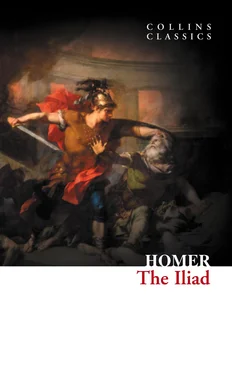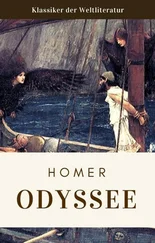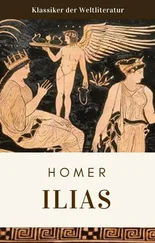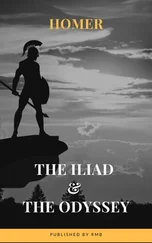Inspired by Juno, Thetis’ godlike son
Convened to council all the Grecian train;
For much the goddess mourn’d her heroes slain.
The assembly seated, rising o’er the rest,
Achilles thus the king of men address’d:
“Why leave we not the fatal Trojan shore,
And measure back the seas we cross’d before?
The plague destroying whom the sword would spare,
’Tis time to save the few remains of war.
But let some prophet, or some sacred sage,
Explore the cause of great Apollo’s rage;
Or learn the wasteful vengeance to remove
By mystic dreams, for dreams descend from Jove.
If broken vows this heavy curse have laid,
Let altars smoke, and hecatombs be paid.
So Heaven, atoned, shall dying Greece restore,
And Phoebus dart his burning shafts no more.”
He said, and sat: when Chalcas thus replied;
Chalcas the wise, the Grecian priest and guide,
That sacred seer, whose comprehensive view,
The past, the present, and the future knew:
Uprising slow, the venerable sage
Thus spoke the prudence and the fears of age:
“Beloved of Jove, Achilles! would’st thou know
Why angry Phoebus bends his fatal bow?
First give thy faith, and plight a prince’s word
Of sure protection, by thy power and sword:
For I must speak what wisdom would conceal,
And truths, invidious to the great, reveal,
Bold is the task, when subjects, grown too wise,
Instruct a monarch where his error lies;
For though we deem the short-lived fury past,
’Tis sure the mighty will revenge at last.”
To whom Pelides:—“From thy inmost soul
Speak what thou know’st, and speak without control.
E’en by that god I swear who rules the day,
To whom thy hands the vows of Greece convey.
And whose bless’d oracles thy lips declare;
Long as Achilles breathes this vital air,
No daring Greek, of all the numerous band,
Against his priest shall lift an impious hand;
Not e’en the chief by whom our hosts are led,
The king of kings, shall touch that sacred head.”
Encouraged thus, the blameless man replies:
“Nor vows unpaid, nor slighted sacrifice,
But he, our chief, provoked the raging pest,
Apollo’s vengeance for his injured priest.
Nor will the god’s awaken’d fury cease,
But plagues shall spread, and funeral fires increase,
Till the great king, without a ransom paid,
To her own Chrysa send the black-eyed maid.
Perhaps, with added sacrifice and prayer,
The priest may pardon, and the god may spare.”
The prophet spoke: when with a gloomy frown
The monarch started from his shining throne;
Black choler fill’d his breast that boil’d with ire,
And from his eye-balls flash’d the living fire:
“Augur accursed! denouncing mischief still,
Prophet of plagues, for ever boding ill!
Still must that tongue some wounding message bring,
And still thy priestly pride provoke thy king?
For this are Phoebus’ oracles explored,
To teach the Greeks to murmur at their lord?
For this with falsehood is my honour stain’d,
Is heaven offended, and a priest profaned;
Because my prize, my beauteous maid, I hold,
And heavenly charms prefer to proffer’d gold?
A maid, unmatch’d in manners as in face,
Skill’d in each art, and crown’d with every grace;
Not half so dear were Clytaemnestra’s charms,
When first her blooming beauties bless’d my arms.
Yet, if the gods demand her, let her sail;
Our cares are only for the public weal:
Let me be deem’d the hateful cause of all,
And suffer, rather than my people fall.
The prize, the beauteous prize, I will resign,
So dearly valued, and so justly mine.
But since for common good I yield the fair,
My private loss let grateful Greece repair;
Nor unrewarded let your prince complain,
That he alone has fought and bled in vain.”
“Insatiate king (Achilles thus replies),
Fond of the power, but fonder of the prize!
Would’st thou the Greeks their lawful prey should yield,
The due reward of many a well-fought field?
The spoils of cities razed and warriors slain,
We share with justice, as with toil we gain;
But to resume whate’er thy avarice craves
(That trick of tyrants) may be borne by slaves.
Yet if our chief for plunder only fight,
The spoils of Ilion shall thy loss requite,
Whene’er, by Jove’s decree, our conquering powers
Shall humble to the dust her lofty towers.”
Then thus the king: “Shall I my prize resign
With tame content, and thou possess’d of thine?
Great as thou art, and like a god in fight,
Think not to rob me of a soldier’s right.
At thy demand shall I restore the maid?
First let the just equivalent be paid;
Such as a king might ask; and let it be
A treasure worthy her, and worthy me.
Or grant me this, or with a monarch’s claim
This hand shall seize some other captive dame.
The mighty Ajax shall his prize resign;
Ulysses’ spoils, or even thy own, be mine.
The man who suffers, loudly may complain;
And rage he may, but he shall rage in vain.
But this when time requires.—It now remains
We launch a bark to plough the watery plains,
And waft the sacrifice to Chrysa’s shores,
With chosen pilots, and with labouring oars.
Soon shall the fair the sable ship ascend,
And some deputed prince the charge attend:
This Creta’s king, or Ajax shall fulfil,
Or wise Ulysses see perform’d our will;
Or, if our royal pleasure shall ordain,
Achilles’ self conduct her o’er the main;
Let fierce Achilles, dreadful in his rage,
The god propitiate, and the pest assuage.”
At this, Pelides, frowning stern, replied:
“O tyrant, arm’d with insolence and pride!
Inglorious slave to interest, ever join’d
With fraud, unworthy of a royal mind!
What generous Greek, obedient to thy word,
Shall form an ambush, or shall lift the sword?
What cause have I to war at thy decree?
The distant Trojans never injured me;
To Phthia’s realms no hostile troops they led:
Safe in her vales my warlike coursers fed;
Far hence removed, the hoarse-resounding main,
And walls of rocks, secure my native reign,
Whose fruitful soil luxuriant harvests grace,
Rich in her fruits, and in her martial race.
Hither we sail’d, a voluntary throng,
To avenge a private, not a public wrong:
What else to Troy the assembled nations draws,
But thine, ungrateful, and thy brother’s cause?
Is this the pay our blood and toils deserve;
Disgraced and injured by the man we serve?
And darest thou threat to snatch my prize away,
Due to the deeds of many a dreadful day?
A prize as small, O tyrant! match’d with thine,
As thy own actions if compared to mine.
Thine in each conquest is the wealthy prey,
Though mine the sweat and danger of the day.
Some trivial present to my ships I bear:
Or barren praises pay the wounds of war.
But know, proud monarch, I’m thy slave no more;
My fleet shall waft me to Thessalia’s shore:
Left by Achilles on the Trojan plain,
What spoils, what conquests, shall Atrides gain?”
To this the king: “Fly, mighty warrior! fly;
Thy aid we need not, and thy threats defy.
There want not chiefs in such a cause to fight,
And Jove himself shall guard a monarch’s right.
Of all the kings (the god’s distinguish’d care)
To power superior none such hatred bear:
Читать дальше












